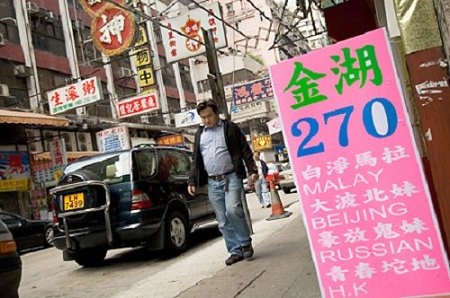
A street sign in Hong Kong that reads, 'Pale skinned Malaysian girls; busty northern women; wanton ghost girls from Russia ("Ghost girl" is slang for a "white woman"); young, fresh Hong Kong girls.'
Over 45 million people are living in some form of modern slavery, according to a new report.
The 2016 Global Slavery Index, a report by Australia-based human rights organization Walk Free Foundation, reported on Tuesday that 45.8 million of the world’s population is enslaved. The figure has increased by 10 million since 2014 when the group released its last report.
The report defines slavery as "situations of exploitation that a person cannot refuse or leave because of threats, violence, coercion, abuse of power or deception,” including early or forced marriage, organ trafficking, debt-based labor, and prostitution.
Susceptibility to enslavement is due to an interaction of various factors, according to the report. It broke down 24 measures of vulnerability into four dimensions: civil and political protections, social health and economic rights, personal security, and refugee populations and conflict.
The report found that over half (58 percent) of the population of those living in slavery are in India, China, Pakistan, Bangladesh, and Uzbekistan. India has the highest number of slaves at 18.35 million, followed by China at 3.39 million and Pakistan at 2.13 million.
The index noted that “Several of these countries provide the low-cost labour that produces consumer goods for markets in Western Europe, Japan, North America and Australia.”
North Korea was found to be the country with the highest estimated prevalence of modern slavery by proportion of the population at 4.4 percent of the 25.15 million population, followed by Uzbekistan at 4 percent of the total population of 31.13 million. In the ranking of countries by government response, North Korea was found to be doing the least to combat slavery, characterized by “government complicity, low levels of political will, or high levels of conflict and political instability,” along with Iran, Eritrea, Equatorial Guinea, Hong Kong, Central African Republic, Papua New Guinea, Guinea, the Democratic Republic of the Congo and South Sudan.
Data on government action was not able to be collected for Afghanistan, Iraq, Libya, Somalia, Syria or Yemen due conflict and government instability.
On the other hand, the Netherlands, the United States, Britain, Sweden, and Australia were found to be the countries with governments that responded the most strongly to cases of slavery.
Countries that were found to have a strong response with fewer resources include the Philippines, Brazil, Georgia, Jamaica, Croatia, Montenegro, Macedonia, Moldova, Albania and Serbia.
Founder of the Walk Free Foundation Andrew Forrest recognized that the collected data extrapolated the estimates for some nations based on data collected for other nations, which could be a point of criticism.
“Measuring the number of people in modern slavery is a difficult undertaking due to the hidden nature of this crime and low levels of victim identification,” the report reads.
However, "Without measurement you don't have effective management and there's no way to lead the world away from slavery," he told the the Thomson Reuters Foundation. “We want this index to be a call to action.”
The report was based on interviews with 42,000 respondents by Gallup across 25 countries in 53 different languages, ranking 167 countries according to the proportion of population in slavery, absolute number of people in slavery, measures of vulnerability, and government response.
"We need to make it clear we're not going to tolerate slavery and when there is slavery in a regime we should not trade with them," Forrest said.












